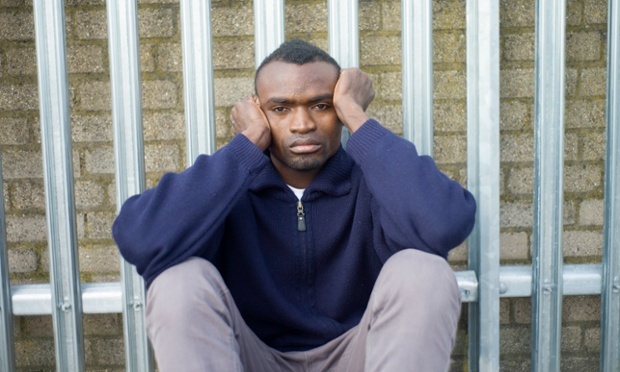Lola’s account dwelt on the torture that she (at such a young age) and her family had to endure and the telling effect of such an experience on the family.
 I found Lola Shoneyin’s piece on Buhari titled, “How My Father’s Jailer Can Offer Nigeria A Fresh Start” very engaging although it dredged up some very painful memories. It took me down memory lane; indeed, it was a vivid reminder of an awful road on which l and others like Audu Ogbeh, now an ardent Buhari backer, travelled.
I found Lola Shoneyin’s piece on Buhari titled, “How My Father’s Jailer Can Offer Nigeria A Fresh Start” very engaging although it dredged up some very painful memories. It took me down memory lane; indeed, it was a vivid reminder of an awful road on which l and others like Audu Ogbeh, now an ardent Buhari backer, travelled.
It was my painful duty as the “Captain” of the detainees, to receive Lola’s father, Engr. Tinuoye Shoneyin into the Abeokuta prison and to make him as comfortable as possible in the extremely difficult prison environment, providing him with clothes, a towel and toiletries.
Engr. Shoneyin had, as a matter of courtesy, responded to the invitation of the government of Ogun State then led by Colonel Oladipo Diya, who later became the deputy to Gen. Sani Abacha, to answer some questions and had expected to be back home that evening. He was not to return home for six months!
Lola’s account dwelt on the torture that she (at such a young age) and her family had to endure and the telling effect of such an experience on the family. Many detainees never recovered from the torture and the injustice that this experience represented. In many cases, mine included, there was no accusation, much less a charge.
One slight misstatement in Lola’s account was that the detention was at the behest of Col. Tunde Idiagbon, the erstwhile deputy to General Buhari. I doubt if that is quite true.
The problem with autocracy is that once the atmosphere has been established or allowed by the leader, many tin gods at the various levels of the strata will for any number of reasons, exploit the situation for the purpose of settling personal and petty scores including disputations over girlfriends!
So in the case of Lola’s father, the local despot at the time was Colonel Oladipo Diya who was mean, brutal and sadistic and locked up as many people as he wanted, for good, bad or sometimes no reason at all. He flogged civil servants for lateness, taxed the people on every imaginable score, and signed for nearly 20 people who had been sentenced to death (none of whom his predecessor permitted to be killed), to be executed by hanging in one day.
He reveled in making people suffer wherewith he was promptly given the name of “Kunya” meaning tormentor which was the direct opposite of what his name “Diya” means in the Yoruba language. He was, indeed, the harbinger of torment and suffering. He it was who saw a ghost in every situation. If the sun was too bright he blamed it on the dethroned politicians. He was a cruel taskmaster who tried irrationally to get water out of stone.
At a stage he rounded up contractors who had done various jobs for the state government and dictated that they should either pay certain arbitrary fines or be locked up in prison. I was in the gulag for 18 months, 16 of which l spent in the Abeokuta prison. Prior to this time, I had presided over three Ministries in four years and three months. There was never an accusation or a charge of any sort against me. His investigators were surprised at how clean my affairs were and how l could succinctly explain every transaction l was involved in including providing photocopies of cheques that even pre-dated my appointment.
“Were you expecting that this type of thing would happen? Why did you leave a thriving law practice for a job like this?” they asked me repeatedly. Therein lies the dilemma of our country that needs good people to preside over its affairs, yet castigates the few who dare to get in the fray. “The punishment for the wise who refuse to take part in the government of their people,” said a Greek philosopher, “is to be ruled by fools.”
I came to understand that Diya’s grouse with me was that l was so close to the late Chief Olabisi Onabanjo, my governor, and that there was no way of getting Onabanjo without getting Adefulu his political son and confidant! “Onabanjo did nothing Adefulu did not know of,” Diya was reported to have said repeatedly. So l had to be purged! Oluokun the head of state security, himself a dastardly character, was Diya’s hatchet man.
When all efforts at intimidation and harassment failed, they changed tactics and tried to recruit me as an informant against Onabanjo. It soon became clear to them however, that I was not going to be party to their pursuit of crass injustice and motive hunting. I asked Oluokun pointedly to cock his gun and shoot and kill me because under no circumstances would l be part of such villainy. In any case, unless l wanted to become a liar, such incriminating evidence did not exist except in the figment of Diya’s convoluted imagination.
Onabanjo was the quintessential leader – open, fair minded, as straight as a spoke and a great lover of the people; a man who, to this day, several years after his demise, l still hold in the highest regard.
At the time of my incarceration, my family was at a more delicate stage than the Shoneyins, because it was younger and less endowed. My first son Adeoye, was just under 10 years and our last daughter, Dayo was three months old. I was 37 years old at the time of the coup. My family was subjected to a long and extremely humiliating deprivation. It was the unjust compensation l received for a job to which l gave the very best of my life at a very young age (try as you may, such injustice never leaves you. The wound may heal but the scar is there and sometimes stares you in the face). I tried hard to be strong and for the most part, l was. The knowledge that I had served with the very best of my ability in a job l truly enjoyed, gave me peace of mind and assurance.
The open and vocal agitation of many well-meaning citizens such as Professor Wole Soyinka for my release was an act of grace for which l will forever be grateful. The only time l broke down was the day my son, Adeoye, turned 10. With a smuggled recorder, I had recorded a birthday message for him and his young siblings admonishing them to be strong in the knowledge that God was on our side. After recording the message, l wept profusely. It was terrible!
My co-prisoners, including my Deputy Governor, the late Chief Sesan Soluade, and the present Emir of Suleija, Alhaji Anwal Ibrahim, the erstwhile Governor of Niger State, and the others, tried hard to console me. I had been the strong one, the encourager of the brethren, but l guess the cup had become too full and it ran over. While time heals, the impact of such injustice endures. It leaves a telling effect which you carry for the rest of your life. Ironically, when l was finally released, l was in hospital where l had just undergone an emergency operation. Liberty had come at last but it met me totally broken and incapacitated. At my release and after, no one offered any apology for this gruesome and very unjust recompense.
Nobody, without due process, should ever have the power to visit such humiliation and injustice on any human being. The irony of dictatorship is that a leader can be so conscientiously wrong in his crusading mission.
The Buhari regime was very wrong in my case as in the case of several others. I, along with many others, had come into office with the purest motive of service. It was what l had always wanted to do. I thought it was my life’s mission and when the opportunity came l did the work as if my life depended on it. I left a lucrative practice to serve my people. I was totally accountable, yet l was unfairly thrown into jail for no just cause for 18 months!
That was many years ago and since l have focused on re-building my life and raising my family.
I have prayed and tried hard to forgive my unjust tormentors but l know that the scar is there and people like Lola Shoneyin stroke that weak point now and again, albeit unwittingly.
Obviously this is not an experience that can be wished away because it evidently affected my being and changed my life fundamentally. It makes me appreciate people like Mandela so much – 26 years on Robben Island (have you been there?) and he came out with no bitterness and no guile! Such men are rare!
Understandably then, it has taken some effort for me to embrace Buhari’s candidacy. I have never voted for him. I did not even like him. But as my friend, Audu Ogbeh said to me once, “so much has gone wrong with our polity, that our emphasis now must not be on ourselves but on the survival of the nation.” I have no doubt he is right. This is a time when the overriding interest must be that of the country. As a student of history, l know that while constitutions can be copied and adopted, in the end every nation will only learn by its national experience.
The history of many of the democracies we admire today is replete with unimaginable and odious occurrences that characterized their development. It is obvious to me that the trust we reposed in President Jonathan in 2011 has been wantonly squandered. The sobering state of our nation and realpolitik has made me take another look at Buhari. How viable is he for our polity given the available options? Is the General, the devil he is portrayed to be, or a victim of circumstances or a misunderstood individual? To me President Jonathan has been such a disappointment in many critical areas of our national life.
There has been unprecedented violence and blood letting under this administration, which, naively in my view, treated the Boko Haram insurgency with kid gloves and a total lack of resolve. Today, Boko Haram has established a formidable force and has succeeded, before our very eyes, in changing the map of Nigeria.
The President appears to have turned deaf ears to the voices of wisdom and surrounded himself with cronies whose main pre-occupation is to exploit him. Some of his spokesmen have made a virtue of rascality and turned public relations upside down. Miscreants who should be in jail for their past deeds are the ones now threatening that our collective vote must go a particular way or there will be insurrection.
We never heard of “democracy” at gunpoint till now.
To the discerning, it is clear that the Boko Haram insurgency has been employed as a source of inscrutable abuse, or how else do we explain a Nigerian private plane filled with raw US dollars being impounded abroad?
How many such planeloads escaped without being caught is anybody’s guess, yet our troops are said to be so ill equipped that the insurgents have better arms. All this despite the huge sums that have been voted for defence under this administration; one wonders where all that money went.
Then the massive corruption in every sphere of public office – pension funds stuffed into pillows and mattresses, etc.
The disgusting state pardon for a man who, before an incredulous world, broke the terms to a court order and left Britain dressed as a woman!
This is not how a leader should exercise such hallowed prerogative power. The President’s conduct sent a chilling message down the spine of the polity that corruption and stealing are the way to go. You can add to that the company of shady men wanted abroad for all manner of crimes, including drug offences, who have been installed in positions of leadership in the PDP or have been fielded as Senatorial candidates.
The management or lack of it of our foreign reserves (which have become totally depleted) and reports of billions of missing dollars dominate the air. Everybody who is working hard is in trouble. Joblessness has risen to record levels. The youths are, justifiably restless because they have no future in the present dispensation. The tales of woe are just endless. Billions of dollars have disappeared into petroleum subsidy yet even the cost of kerosene, the poor man’s fuel, is at an all-time high. It is the oil sheiks that are being subsidized not the ordinary people. To say the ship of state is clearly adrift in Nigeria is an understatement.
A land that should be flowing with milk and honey has become the laughing stock of the international community.
We simply can no longer tolerate this grotesque level of gluttony and of corruption.
There is an urgent need for a change otherwise, we face a huge problem and social dis-location ahead beyond what we already have.
These are the reasons why l have embraced Buhari. If you look at his past, and some of the statements credited to him, he is not an easy man for a person like me to embrace. But 30 years is a long time and l honestly believe he has had enough time to reflect and to change. He is no more a military officer. He has retained a sharp, social conscience for the people.
I am impressed with the hunger with which he has fought for elections. I want to believe that it is out of an earnest desire to work for the people and to do some things right that General Buhari has struggled so hard to win the nation’s leadership through the electoral process. While he may not be a saint, he is certainly not a villain. His choice of a very good man in Professor Yemi Osinbajo, for a Vice President gave me the assurance that Buhari was listening to the comments on his areas of weakness. There are enough checks and balances in a democratic set up to make fears of a return to dictatorship a joke. I am also impressed by his modest lifestyle, unlike many of his ilk who live in opulence and indulgence. This says something about the man. I can trust this man with my wallet in a way l cannot do with Jonathan who appears to have forgotten where he came from.
Jonathan has lost the golden opportunity to fundamentally affect the lives of the ordinary folks. I am persuaded that it will be a tragedy for us to continue in this drift for another four years. While Buhari is far from being my ideal candidate and l worry about some of his deficiencies, my perception is that although he may be short on the skills required for the modern management of a state – technology, economic management etc. – his record shows that he has the ability to enlist support. I hope this time he will choose the right people and avoid those who will use his name to do iniquity.
While Buhari may not be the ideal candidate we need, he is, certainly the best we have. There is a time in the history of a nation when an individual is needed to rescue it or perform a historic role. As it was with Winston Churchill who provided Britain with the much needed war-time leadership, General Charles de Gaulle who restored the confidence of France, Madiba, Nelson Mandela of South Africa who championed the cause of majority rule and showed the way to national reconciliation and our own Gen. Olusegun Obasanjo who provided leadership to a country on the brink after the Abacha years, my belief is that this is the hour for Muhammadu Buhari to stop the torment of a hemorrhaging nation and restore its confidence.
Lastly, the General owes me one. I will still like Buhari to vocalize an apology and offer some succour to people like me whom his government brutalized in the past. It is the least he can do. To do so is not weakness. Indeed, it is strength to admit the mistakes of the past and to promote national reconciliation. For now, even ahead of the apology, and in the national interest, l have thrown in my hat with Buhari.
So has Lola Shoneyin’s father. Now 87 but still spritely and alert, my big brother and comrade, Engr. Tinuoye Shoneyin, always a big heart, is enthusiastically by my side at political rallies and party support meetings. Our jailer has become our hope. Life is indeed nothing if not an agglomeration of ironies.
Adeyemi Adefulu MFR , is a Lagos-based lawyer. [via Sahara Reporters]
 Possibly the worst year of my life was 1984. I was 10 years old and blissfully unaware of the changing face of Nigeria’s political landscape. And a rather unyielding face it was – that of Muhammadu Buhari who had recently overthrown Shehu Shagari, a democratically elected president. For Buhari, this was a necessary coup d’etat because Nigeria was being overrun by corrupt politicians. However, his regime would have a devastating impact on my family’s fortunes.
Possibly the worst year of my life was 1984. I was 10 years old and blissfully unaware of the changing face of Nigeria’s political landscape. And a rather unyielding face it was – that of Muhammadu Buhari who had recently overthrown Shehu Shagari, a democratically elected president. For Buhari, this was a necessary coup d’etat because Nigeria was being overrun by corrupt politicians. However, his regime would have a devastating impact on my family’s fortunes. Nigerian author Lola Shoneyin. Photograph: Observer
Nigerian author Lola Shoneyin. Photograph: Observer


 I found Lola Shoneyin’s piece on Buhari titled,
I found Lola Shoneyin’s piece on Buhari titled, 














 He told the House of Representatives committee on banking and currency at the 2015 budget defence that apart from the notes, other security documents of the countries would also be printed by the NSPM.
He told the House of Representatives committee on banking and currency at the 2015 budget defence that apart from the notes, other security documents of the countries would also be printed by the NSPM.
 “I went from being the happiest guy in the world to a guy making a life-or-death decision. At that point, I decided that I was going to do more music than I have ever done in my life.”
“I went from being the happiest guy in the world to a guy making a life-or-death decision. At that point, I decided that I was going to do more music than I have ever done in my life.”
